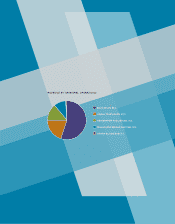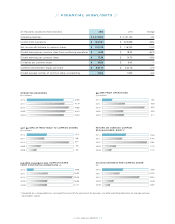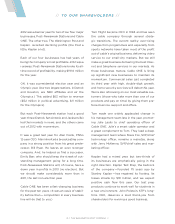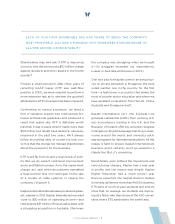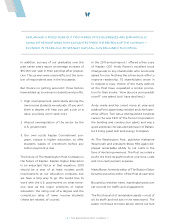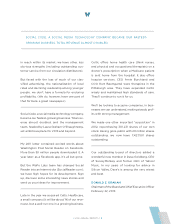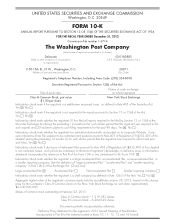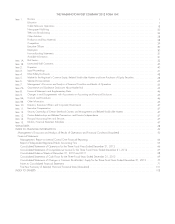Washington Post 2012 Annual Report Download - page 6
Download and view the complete annual report
Please find page 6 of the 2012 Washington Post annual report below. You can navigate through the pages in the report by either clicking on the pages listed below, or by using the keyword search tool below to find specific information within the annual report.
In addition, surveys of our graduates over the
past seven years report an average increase of
$16,000 per year in their earnings after gradua-
tion. The surveys were unscientific, but the num-
ber of respondents was in the thousands.
But there’s no getting around it: three factors
have added up to a drop in students and profits.
1. High unemployment, particularly among the
low-income students we educate. (If you don’t
think a degree will help you get a job or a
raise, you likely won’t seek one.)
2. Absurd overregulation of the sector by the
U.S. government.
3. Our own costly Kaplan Commitment pro-
gram, unique in higher education, to oer
students weeks of enrollment before any
tuition payment is due.
The future of The Washington Post Company is
the future of Kaplan. Kaplan Higher Education
is an important factor in that equation. 2013
should be a year of at least modest profit
improvement at our education company, but
we have a long way to go. We would love to
work with the U.S. government on what every-
one sees as the major problems of higher
education: the rising cost of a degree and the
completion rates of lower income students
(these are related, of course).
In the 2011 annual report, I oered a free copy
of Kaplan CEO Andy Rosen’s excellent book
Change.edu to any shareholder who wrote and
asked for one. Nothing like a free-book oer to
improve readership: 75 shareholders wrote in
to request a copy. (Some of the many authors
at the Post have requested a similar promo-
tion for their books. “How about a young-adult
novel?” one asked, but I have declined.)
Andy made another smart move at year-end,
adding Tom Leppert as president and chief oper-
ating ocer. Tom has a distinguished business
career (he was CEO of The Turner Corporation,
the building and construction giant) and was a
good politician (he was elected mayor of Dallas).
He’ll bring great skill and energy to Kaplan.
At The Washington Post, publisher Katharine
Weymouth and president Steve Hills again dis-
played remarkable ability to cut costs in the
face of declining revenues. The Post recorded a
profit (its third straight) before one-time costs
and non-cash pension expense.
Marty Baron, formerly editor of The Boston Globe,
became executive editor of the Post at year-end.
Buoyed by election news, washingtonpost.com
set records for trac and engagement.
The Post has a lot of remarkable assets—most of
all, its sta (and not just in the newsroom). The
paper continues to tower above others our size
KAPLAN HAD A MIXED YEAR, BUT TWO-THIRDS OF ITS BUSINESSES ARE EMPHATICALLY
GOING IN THE RIGHT DIRECTION. KAPLAN TEST PREP, THE BEDROCK OF THE COMPANY—
FOUNDED 75 YEARS AGO BY STANLEY KAPLAN—HAS REGAINED ITS FOOTING.
4 // THE WASHINGTON POST COMPANY //


